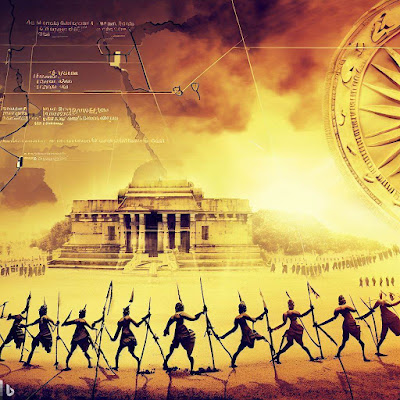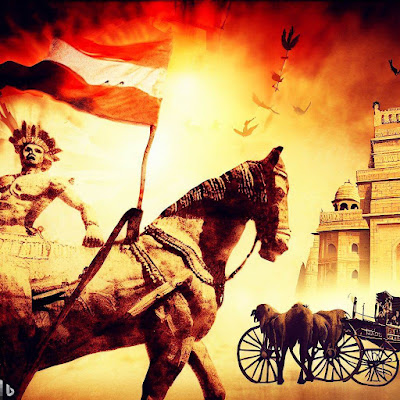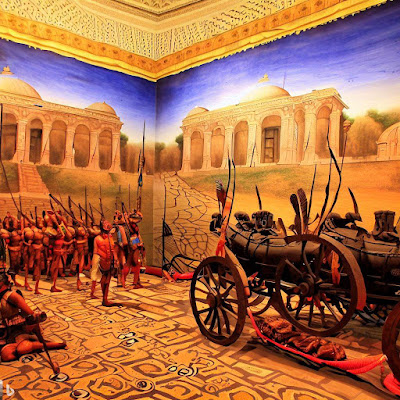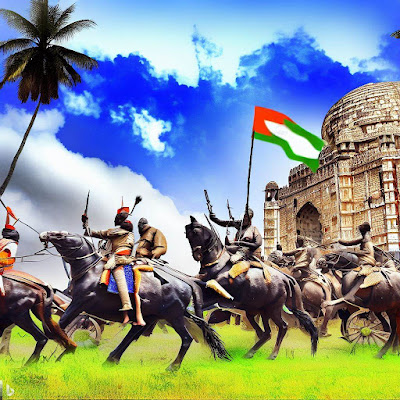Indian history is a rich and diverse tapestry woven through centuries of cultural, social, and political changes.
The Indian subcontinent has been inhabited by various groups of people since prehistoric times, and has witnessed the rise and fall of powerful empires, the advent of various religions, and the struggle for independence from foreign rule.The timeline of Indian history can be divided into several distinct periods, each marked by significant events and developments. The earliest period is the prehistoric era, followed by the Indus Valley Civilization, which was one of the world's earliest urban civilizations. This was followed by the Vedic period, which saw the emergence of the Hindu religion and the caste system.
The next major period was the Mauryan Empire, which was one of the largest and most powerful empires in Indian history. This was followed by the Gupta Empire, which was known for its cultural and artistic achievements.
The medieval period saw the rise of several Muslim dynasties, including the Mughal Empire, which ruled over a large part of the subcontinent for over 300 years. During this time, India also saw the advent of Sikhism and the expansion of European colonialism.
The modern period of Indian history is marked by the struggle for independence from British rule, which culminated in the establishment of the Republic of India in 1947. Since then, India has undergone significant political, social, and economic changes, making it one of the fastest-growing economies in the world today.
👉 here's a detailed timeline of Indian history:
🔶Prehistoric Era:
🔹700,000 BCE to 3300 BCE: Paleolithic period
🔹3300 BCE to 1300 BCE: Neolithic period
🔶Indus Valley Civilization:
🔹3300 BCE to 1300 BCE: Emergence of the Indus Valley Civilization in the northwestern region of the Indian subcontinent.
🔹2600 BCE: The city of Mohenjo-Daro is established in present-day Pakistan.
🔹2500 BCE: The city of Harappa is established in present-day Pakistan.
🔹1900 BCE: Decline of the Indus Valley Civilization.
🔶Vedic Period:
🔹1500 BCE to 500 BCE: The Vedic period, named after the sacred Hindu texts known as the Vedas.
🔹1200 BCE: The Rigveda, the oldest of the Vedas, is composed.
🔶Mauryan Empire:🔹322 BCE to 185 BCE: The Mauryan Empire, founded by Chandragupta Maurya, becomes one of the largest empires in Indian history.
🔹268 BCE to 232 BCE: Reign of Emperor Ashoka, who is known for his conversion to Buddhism and his promotion of religious tolerance.
🔹185 BCE: Decline of the Mauryan Empire.
🔶 Gupta Empire:
🔹320 CE to 550 CE: The Gupta Empire, known for its cultural and artistic achievements, becomes one of the most influential empires in Indian history.
🔹335 CE to 375 CE: Reign of Emperor Chandragupta II, who is known for his military conquests and his patronage of the arts.
🔶Medieval Period:
🔹711 CE: The Arab general Muhammad bin Qasim invades Sindh, marking the beginning of Muslim rule in the Indian subcontinent.
🔹1206 CE to 1526 CE: The Delhi Sultanate, a series of Muslim dynasties, rules over northern India.
🔹1526 CE to 1707 CE: The Mughal Empire, founded by Babur, becomes one of the most powerful empires in Indian history.
🔹1469 CE: Guru Nanak Dev, the founder of Sikhism, is born in present-day Pakistan.
🔹1699 CE: Guru Gobind Singh, the tenth and last Sikh guru, establishes the Khalsa Panth.
🔶Colonial Period:
🔹1498 CE: Portuguese explorer Vasco da Gama arrives in Calicut, marking the beginning of European colonialism in India.
1600 CE: The East India Company is established in India.
🔹1757 CE: The Battle of Plassey, in which the British defeat the forces of the Nawab of Bengal, marks the beginning of British rule in India.
🔹1857 CE to 1858 CE: The Indian Rebellion of 1857, also known as the First War of Indian Independence, is suppressed by the British.
🔹1885 CE: The Indian National Congress is founded, marking the beginning of the Indian independence movement.
🔶Modern Period:
🔹1919 CE: The Jallianwala Bagh massacre, in which British troops fire on unarmed civilians in Amritsar, galvanizes the Indian independence movement.
🔹1929 CE: The Lahore Session of the Indian National Congress adopts the resolution calling for complete independence from British rule.
🔹1947 CE: India gains independence from British rule and is partitioned into India and Pakistan.
🔹1950 CE: The Constitution of India is adopted, establishing India as a republic.
🔹1991 CE: India implements economic liberalization, leading to rapid economic growth.
This is just a brief overview of Indian history, but it should
👉here are some more events and details from Indian history:
🔹3000 BCE: The Sumerian civilization of Mesopotamia has trade relations with the Indus Valley Civilization, as evidenced by artifacts found in both regions.
🔹6th century BCE: The Buddha, the founder of Buddhism, is born in present-day Nepal.
🔹321 BCE: Emperor Chandragupta Maurya defeats the Nanda dynasty and establishes the Mauryan Empire.
🔹269 BCE: Emperor Ashoka ascends to the throne of the Mauryan Empire.
🔹261 BCE: The Kalinga War is fought between the Mauryan Empire and the Kalinga kingdom, resulting in a victory for the Mauryan Empire but prompting Ashoka's conversion to Buddhism and his promotion of non-violence and religious tolerance.
🔹3rd century BCE to 3rd century CE: The Mahabharata and the Ramayana, two of the most important Hindu epics, are composed.
🔹405 CE: The Chinese Buddhist monk Fa Xian arrives in India to study Buddhism and Indian culture.
🔹711 CE: Arab general Muhammad bin Qasim invades Sindh, establishing the Umayyad Caliphate's rule over the region.
🔹1000 CE to 1700 CE: The Indian Ocean trade network, which connected India to East Africa, the Middle East, and Southeast Asia, reaches its peak.
🔹1398 CE: Timur, a Central Asian conqueror, sacks Delhi and massacres thousands of its inhabitants.
🔹1498 CE: Portuguese explorer Vasco da Gama arrives in Calicut, opening up European trade with India.
🔹1605 CE: The Mughal emperor Akbar dies, leaving behind a legacy of religious tolerance and cultural syncretism.
🔹1644 CE to 1661 CE: The reign of the Mughal emperor Shah Jahan, during which the Taj Mahal is built.
🔹1757 CE: The Battle of Plassey, in which the British defeat the forces of the Nawab of Bengal, marks the beginning of British rule in India.
🔹1835 CE: English becomes the language of instruction in Indian schools, displacing traditional Indian languages and leading to a decline in traditional knowledge systems.
🔹1858 CE: The British government takes direct control of India following the Indian Rebellion of 1857.
🔹1915 CE: Mahatma Gandhi returns to India from South Africa and becomes a leading figure in the Indian independence movement.
🔹1920 CE: The Non-Cooperation Movement, led by Gandhi, calls for Indians to boycott British goods and institutions.
🔹1930 CE: The Salt March, led by Gandhi, protests the British salt tax and becomes a turning point in the Indian independence movement.
🔹1947 CE: India gains independence from British rule and is partitioned into India and Pakistan, leading to widespread violence and displacement.
🔹1971 CE: East Pakistan declares independence from Pakistan and becomes the new country of Bangladesh following a war with Pakistan.
🔹1998 CE: India conducts its first nuclear tests, sparking international condemnation.
🔹2014: Narendra Modi is elected as Prime Minister of India, leading the Bharatiya Janata Party (BJP) to a landslide victory in the general elections. Modi's campaign focuses on economic development, job creation, and fighting corruption.
🔹2016: The Indian government demonetizes the 500 and 1000 rupee notes, removing 86% of the cash in circulation to combat black money and corruption.
🔹2017: The Goods and Services Tax (GST) is implemented, unifying India's fragmented tax system into a single tax regime.
🔹2018: The Supreme Court of India decriminalizes homosexuality, striking down Section 377 of the Indian Penal Code that had criminalized same-sex relationships.
🔹2019: India conducts its first anti-satellite missile test, demonstrating its ability to destroy satellites in low Earth orbit.
🔹2019: The Indian government revokes the special status of Jammu and Kashmir, India's only Muslim-majority state, and divides it into two union territories, sparking protests and tensions in the region.
🔹2020: 🔺 India imposes one of the world's strictest lockdowns to combat the COVID-19 pandemic, leading to economic disruption and social distress.
🔺India-China border tensions escalate in the Galwan Valley, resulting in the deaths of 20 Indian soldiers and an unknown number of Chinese soldiers.
🔺The Indian government passes controversial farm bills, leading to widespread protests by farmers who fear that the bills will undermine their livelihoods.
🔹2021: 🔺India experiences a devastating second wave of COVID-19, overwhelming the healthcare system and leading to thousands of deaths.
🔺The Indian government passes a new set of labor codes, aimed at reforming the labor laws and improving the ease of doing business in the country.
🔹2022: 🔺India launches its first manned space mission, Gaganyaan, with plans to send astronauts into low Earth orbit by 2023.
🔺The Indian government introduces the National Education Policy, aimed at overhauling the education system and promoting innovation and creativity among students.
🔺India's economy becomes the world's third-largest, surpassing Japan's economy.
These events illustrate the continued evolution and development of India as a modern nation, facing challenges and opportunities on both the domestic and international fronts.
The richness and complexity of Indian history cannot be fully captured in a single timeline, but these events provide a glimpse into the long and diverse history of the Indian subcontinent.
📝India has a rich and complex history, spanning over thousands of years and shaped by various cultural, political, and economic factors. From the Indus Valley Civilization to the present day, India has seen the rise and fall of empires, the spread of religions and ideologies, and the struggles and triumphs of its people.
While it is impossible to capture the entirety of India's history in a single text, a timeline of key events can provide a snapshot of the country's journey over the years. From the freedom struggle to independence, from the Green Revolution to economic liberalization, from the technological revolution to the COVID-19 pandemic, India has faced numerous challenges and opportunities that have shaped its past, present, and future.
As India continues to evolve and develop, it will undoubtedly face new challenges and opportunities. However, with its rich history, diverse culture, and resilient people, India is well-positioned to overcome these challenges and continue on its path towards progress and prosperity.





Comments